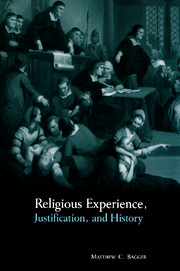Book contents
- Frontmatter
- Contents
- Acknowledgments
- List of abbreviations
- Chapter 1 Introduction: spectral evidences
- Chapter 2 The explanation in experience and the explanation of experience
- Chapter 3 Justification by reasons alone
- Chapter 4 Perennialism revisited
- Chapter 5 The miracle of minimal foundationalism
- Chapter 6 Loves noble Historie: Teresa of Avila's mystical theology
- Chapter 7 Modernity and its discontents
- Bibliography
- Index
Chapter 3 - Justification by reasons alone
Published online by Cambridge University Press: 22 September 2009
- Frontmatter
- Contents
- Acknowledgments
- List of abbreviations
- Chapter 1 Introduction: spectral evidences
- Chapter 2 The explanation in experience and the explanation of experience
- Chapter 3 Justification by reasons alone
- Chapter 4 Perennialism revisited
- Chapter 5 The miracle of minimal foundationalism
- Chapter 6 Loves noble Historie: Teresa of Avila's mystical theology
- Chapter 7 Modernity and its discontents
- Bibliography
- Index
Summary
When philosophers use a word – “knowledge”, “being”, “object”, “I”, “proposition”, “name”, – and try to grasp the essence of the thing, one must always ask oneself: is the word ever actually used in this way in the language-game which is its original home? –
What we do is to bring words back from their metaphysical to their everyday use.
Ludwig Wittgenstein (Philosophical Investigations, no. 116)In chapter 2 we established that the logic of experience implicitly requires a commitment to an explanation. Experiences include inferences to the best explanation, albeit inferences of an informal sort. By emphasizing the pragmatic aspects of explanation, we also gestured toward an explication of explanation. With this partial understanding of experience, we must now, if we wish eventually to assess the justification of religious beliefs by religious experience, undertake a theory of justification. A theory of justification commonly includes two elements: a metaepistemological stance on the conceptual analysis of justification and a substantive view of how justification works. Undoubtedly, this convention reinforces a factitious distinction. One's understanding of the concept of justification clearly carries implications for one's substantive theory and vice versa. The history of the concept, as we will see, amply illustrates this interdependence. Nonetheless, to divide the material along these lines has heuristic merit. Accordingly, I will first discuss the concept of justification and then apply it to the issue at hand: how a belief becomes justified.
- Type
- Chapter
- Information
- Religious Experience, Justification, and History , pp. 58 - 89Publisher: Cambridge University PressPrint publication year: 1999



